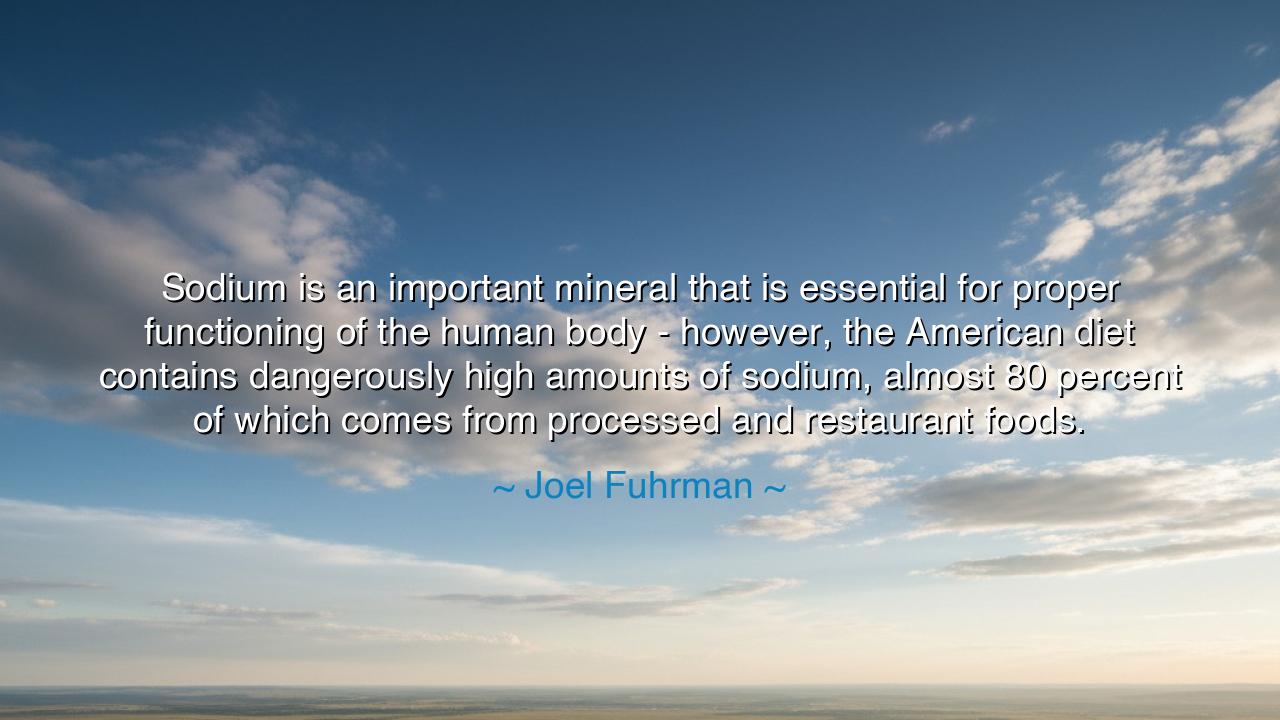
Sodium is an important mineral that is essential for proper
Sodium is an important mineral that is essential for proper functioning of the human body - however, the American diet contains dangerously high amounts of sodium, almost 80 percent of which comes from processed and restaurant foods.






In the illuminating and cautionary words of Joel Fuhrman, physician and sage of nutritional truth, we hear a warning both scientific and moral: “Sodium is an important mineral that is essential for proper functioning of the human body — however, the American diet contains dangerously high amounts of sodium, almost 80 percent of which comes from processed and restaurant foods.” His statement is more than a lesson in health — it is a reflection on the imbalance of modern living. For in this simple element, sodium, lies a story as old as humanity itself — of necessity turned to excess, of wisdom replaced by indulgence, of nature’s balance lost to the machinery of convenience.
The origin of this quote springs from Fuhrman’s lifelong study of nutrition and his deep concern for the modern diet — a diet that, while abundant in flavor and comfort, has become barren in life-giving nourishment. He does not condemn sodium itself, for it is one of the body’s sacred minerals — essential for nerve transmission, muscle contraction, and the harmony of the blood. But Fuhrman’s insight is that excess — the great corrupter of human strength — has turned this gift into poison. His words echo like a call across the ages, reminding us that every element of the earth can be both medicine and curse, depending on how it is used.
The ancients knew this truth well. The philosopher Hippocrates, father of medicine, taught that the body’s balance must mirror the balance of nature — that health arises not from abundance, but from equilibrium. In ancient times, salt was revered as sacred; it preserved food, cleansed wounds, and symbolized purity. To share salt at a table was to seal friendship and trust. Yet the wise also knew that too much salt desiccates the body and spirit, drying up vitality as surely as the sun scorches the fields. Even in the old texts of the East, balance in all things — from emotion to diet — was called the Middle Way, the path between deprivation and excess. Fuhrman’s words are thus not new wisdom, but the rekindling of old fire: the reminder that what sustains life must be treated with respect.
Consider the story of the sailors of old, who once crossed vast oceans on salted meats and hard bread, carrying no fresh fruits or greens. At first, salt kept them alive — preserving their food from decay — but as months passed, their bodies weakened. Their gums bled, their skin tore, their hearts faltered. What had begun as preservation ended in ruin, for they lacked nature’s true gifts: the fresh produce that carries the balance of minerals and vitality. Their suffering became a symbol of what happens when man divorces himself from the natural order — when he lives from what is preserved, processed, and artificial, rather than from what is living. So too, Fuhrman warns, does the modern diet make us prisoners of convenience, drowning our bodies in salt and our spirits in weariness.
The processed foods of today are the new ships of decay — their flavors rich but false, their appeal immediate but deadly. Each bite from the modern table, laden with sodium and chemical preservation, fills the mouth but empties the body. The great irony of our age is that plenty has made us weak. Our ancestors fought hunger; we battle indulgence. Our hearts, once strong from labor and simple fare, now strain under the burden of abundance. The mineral that once symbolized purity has become the emblem of imbalance. And yet, Fuhrman’s message is not despair — it is hope, for the remedy lies within reach, as simple and ancient as the problem itself.
He calls us to return to the food of the earth — to the fruits, vegetables, grains, and seeds that carry nature’s perfect design. These foods contain sodium in its purest, balanced form, bound with other minerals that support the rhythm of life. They do not assault the body with excess but nourish it with harmony. To eat thus is to honor both the wisdom of nature and the wisdom of restraint. It is to remember that the body, like the world, is sustained not by force, but by balance. In this teaching lies the hidden power of self-mastery — the ability to choose wholeness over indulgence, simplicity over excess.
So, my child of the future, learn from Joel Fuhrman’s words as the ancients learned from nature: seek balance in all things. Let your food be fresh, your flavors clean, your choices deliberate. Resist the easy path of the processed and the artificial, for their sweetness conceals decay. Eat from the garden more than from the factory. Season your life not with excess, but with wisdom. And in doing so, you will preserve not only your heart, but your clarity, your strength, and your peace.
For this is the eternal truth hidden in Fuhrman’s teaching: that health is harmony, and harmony is born of respect — respect for the gifts of the earth, for the limits of the body, and for the balance that sustains all life. If you would live long and live well, remember this: the same salt that seasons your food can also dry your soul. Choose therefore the path of moderation, and you shall find in every simple meal the taste of vitality, gratitude, and enduring grace.






AAdministratorAdministrator
Welcome, honored guests. Please leave a comment, we will respond soon